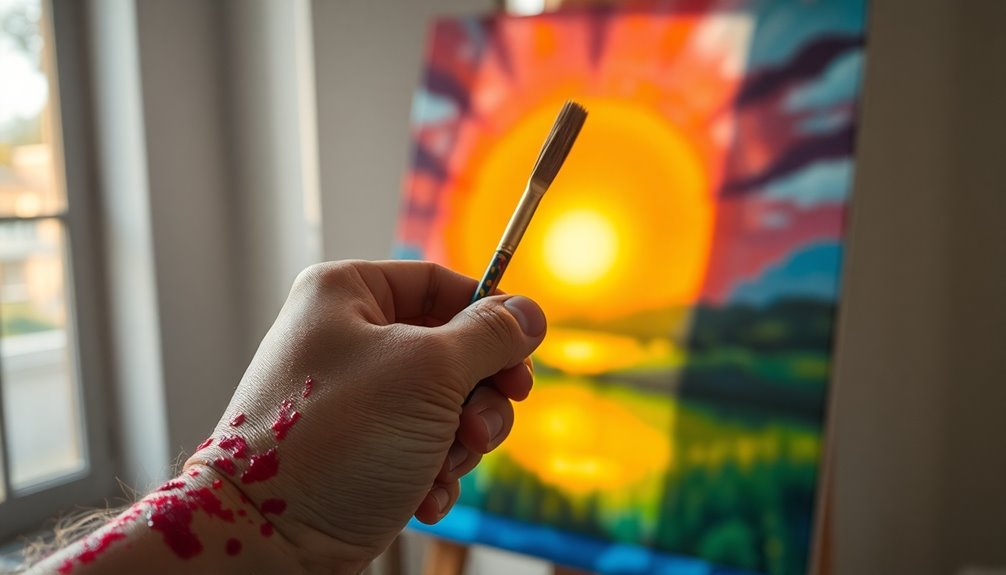To build strong relationships through empathy and compassion, focus on truly understanding others’ perspectives and showing genuine care. Be attentive, listen actively, and express yourself honestly to create a safe environment for openness. Small acts of kindness and being consistent in your actions deepen trust and emotional safety. By balancing your energy and staying present, you foster authentic connections that can withstand challenges. Keep exploring these tools to strengthen your relationships even further.
Key Takeaways
- Practice active listening to understand others’ feelings and perspectives genuinely.
- Show empathy by acknowledging struggles and offering support during tough times.
- Demonstrate compassion through small, thoughtful gestures that affirm care and concern.
- Foster emotional safety by creating an open, honest environment for sharing feelings.
- Maintain consistency in actions and words to build trust and deepen emotional bonds.

Have you ever wondered what it takes to build truly strong relationships? It all begins with trust development and effective communication. When you prioritize these elements, you create a solid foundation that can withstand challenges and foster genuine connection. Trust doesn’t happen overnight; it’s built gradually through consistent actions, honesty, and reliability. You show others they can count on you by keeping your promises and being transparent about your intentions. When people see that you’re dependable, they’re more likely to open up and share their true selves, reinforcing the bond between you.
Effective communication plays a *vital* role in strengthening relationships. It’s not just about talking; it’s about listening actively and expressing yourself clearly. When you listen without judgment, you demonstrate empathy and respect, making others feel valued. This kind of attentive listening encourages openness, allowing deeper conversations to unfold naturally. Be mindful of your tone and body language, as these non-verbal cues often speak louder than words. When you communicate with honesty and kindness, you build a safe environment where both parties feel comfortable sharing their thoughts and feelings.
Empathy and compassion are the *keystone* that holds effective communication and trust together. When you genuinely put yourself in someone else’s shoes, you create a space where they feel understood and accepted. This understanding fosters emotional safety, which is essential for any meaningful relationship. Show compassion by offering support during difficult times and celebrating successes together. When you acknowledge others’ struggles and joys, you deepen the connection and affirm that you care beyond superficial interactions.
Additionally, aligning your energy through practices like energetic alignment can enhance your ability to connect authentically and foster harmony in your relationships. When your energy is balanced, you’re more receptive and open, which encourages mutual understanding and trust.
Consistency is *fundamental* in nurturing these qualities. Make a conscious effort to be present and attentive, whether during casual conversations or serious discussions. Small gestures of kindness, like remembering important dates or checking in during tough times, reinforce your commitment. Over time, these actions cultivate trust and demonstrate your genuine concern for the other person’s well-being.
Building strong relationships through empathy and compassion isn’t just about grand gestures. It’s about everyday choices—being honest, listening attentively, offering support, and showing kindness. When you invest in these practices, you create an environment of mutual respect and understanding. This not only deepens your current relationships but also paves the way for new connections founded on trust and effective communication. Ultimately, it’s these qualities that turn casual acquaintances into lifelong bonds, enriching your life and theirs in meaningful ways.
Frequently Asked Questions
How Can I Develop Empathy in Daily Interactions?
To develop empathy in daily interactions, start practicing active listening by giving your full attention and avoiding interruptions. Pay close attention to emotional awareness, noticing others’ feelings and body language. Ask thoughtful questions to understand their perspective better. By genuinely engaging and showing interest, you’ll foster deeper connections. Over time, these habits will strengthen your ability to empathize, making your relationships more meaningful and supportive.
What Are Common Barriers to Showing Compassion?
Like a ship battling rough seas, you might face barriers to showing compassion, such as empathy fatigue and emotional boundaries. When you’re drained or overwhelmed, it’s hard to open your heart fully. Setting clear emotional boundaries helps protect your well-being, but if you ignore fatigue, compassion wanes. Recognizing these barriers allows you to navigate relationships more effectively, keeping your capacity for kindness steady even amid life’s storms.
How Does Empathy Improve Conflict Resolution?
Empathy boosts conflict resolution by helping you understand others’ perspectives, unlike sympathy which can distance you emotionally. When you practice empathy, you increase your emotional intelligence, allowing you to respond thoughtfully rather than reactively. This creates a safe space for open dialogue, reduces misunderstandings, and fosters mutual respect. As a result, conflicts become opportunities for growth, and your relationships strengthen through genuine connection and shared understanding.
Can Empathy Be Learned or Is It Innate?
You can definitely learn empathy; it’s not just innate. While empathy differs from sympathy—where you feel for someone—emotional intelligence helps you understand and share others’ feelings. By actively practicing listening and observing, you build your empathy skills over time. So, with effort and awareness, you can develop greater compassion and emotional intelligence, strengthening your relationships and improving your ability to connect deeply with others.
How Do Cultural Differences Affect Empathy and Compassion?
Cultural differences considerably influence how you express and perceive empathy and compassion. Cultural norms shape emotional expression, so in some cultures, openly showing vulnerability is valued, while in others, restraint is preferred. This can impact your ability to connect empathetically with others from different backgrounds. To build strong relationships, you need to be aware of these differences, adapt your approach, and show genuine understanding of diverse emotional expressions.
Conclusion
By practicing empathy and compassion, you create bonds that truly last. When you listen with an open heart and understand others’ perspectives, you foster trust and connection. These qualities turn simple interactions into meaningful relationships. So, aren’t the most valuable connections worth the effort? Remember, building strong relationships isn’t about grand gestures—it’s about consistently showing you care. Keep prioritizing empathy and compassion, and watch your relationships flourish in ways you never imagined.











